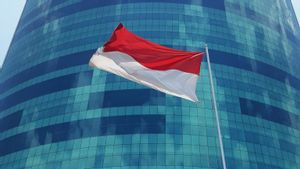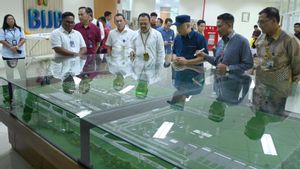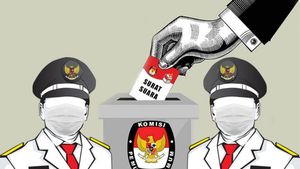JAKARTA - Banks in Indonesia are still busy providing funding for the coal industry, the amount reaches Rp. 89 trillion. There are even allegations that there was funding for a group of coal companies with the initials BG in South Sumatra which was allegedly carried out by PT Bank Negara Indonesia (Persero) or BNI without using collateral or the collateral was not commensurate with the loan.
Responding to this, the Coordinator of the Anti-Corruption Society (MAKI) Boyamin Saiman said that a loan without collateral and has the potential to become bad credit can be categorized as a criminal act of corruption if it fulfills two conditions.
"First, the loan is bad and then the entrepreneur does not try to pay off the debt. Second, the bank must be a state-owned bank, if it is a private bank then it is not corruption," said Boyamin, in his statement, quoted Wednesday, May 25.
Regarding the issue that the bank loan money was not used entirely for coal production operations, Boyamin said that it was clearly forbidden to use it for other things.
"You can't. But the key can be processed by corruption if the debt is bad," he continued.
Meanwhile, a Legal Observer from Gajah Mada University, Muhammad Fatahillah Akbar, said that lending and borrowing entered the realm of banking and the rules without or with collateral should be rigidly regulated in the bank's internal rules.
"So the answer lies in state-owned banks. If the amount is large, there should be adequate guarantees. The guarantee is also tied to mortgage rights and there is an appraisal to assess the guarantee as higher than the debt," said Akbar.
Likewise, if there is a potential for bad credit, there must be adequate guarantees. Because according to him, there have been a lot of bad credit SOEs that have been ensnared by corruption.
"The main element is whether the granting of credit abuses authority. If so, then it is included in Article 3 of the Corruption Law," he said.
Then according to him, if the loan is against the Financial Services Authority Regulation (POJK) then it can be called abuse of authority.
"If you have passed the POJK, then this is part of the abuse of authority," he said.
Separately, BNI Corporate Secretary, Mucharom could not answer the question of funding for the BG group of companies in South Sumatra. However, his party acknowledged that the process of providing funds had gone through a series of processes that prioritized the principles of good corporate governance and compliance with regulatory provisions in order to provide comfort and security to customers and debtor.
So that all the rules both internal and external are met. "However, we have to be realistic, the people of Indonesia still need fossil energy. Meanwhile, credit distribution to the coal sector is only 2 percent of BNI's total credit. In general, credit to the coal sector is in a smooth position," Mucharom told reporters in Jakarta, Tuesday 24 May.
He also revealed that from January to March 2022, BNI was quite aggressive in disbursing financing to the new and renewable energy sector (EBT) worth Rp. 10.3 trillion, followed by financing for pollution prevention of Rp. 6.8 trillion, and other green financing of Rp. 23.3 trillion.
Meanwhile, Banking Observer Deni Daruri said that providing loans without sufficient collateral is not justified. "It is not justified, because it is very risky for the bank itself," Deni told reporters.
Moreover, he continued, there is a potential for the credit to fail, so that according to him it will be detrimental to the bank. "Make the bank lose, so it drains the bank's capital," he continued.
The English, Chinese, Japanese, Arabic, and French versions are automatically generated by the AI. So there may still be inaccuracies in translating, please always see Indonesian as our main language. (system supported by DigitalSiber.id)











